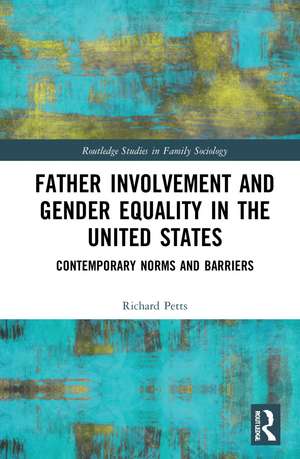Father Involvement and Gender Equality in the United States: Contemporary Norms and Barriers: Routledge Studies in Family Sociology
Autor Richard Pettsen Limba Engleză Paperback – 27 mai 2024
Fathers play an important role in contributing to, and perhaps reducing, gender inequality, but barriers to their involvement in family life have received less attention than detailing challenges that mothers face. If men were equally involved in all aspects of domestic life (i.e., were fully engaged dads), women's burdens would be reduced and perceptions of who is responsible for parenting may change, resulting in greater gender equality. Father Involvement and Gender Equality in the United States focuses on the key issue of father involvement, seeking to understand why fathers are less involved at home than mothers despite an increased desire for fathers to be more engaged parents. This book utilizes recent national survey data, interviews with fathers, and insights from the author’s personal experience as a father to identify current norms of fatherhood within the United States, barriers to father involvement, and strategies to overcome these barriers. Overall, this book argues that by establishing the expectation that fathers will be fully engaged dads as a cultural norm, and by providing structural opportunities for fathers to meet this cultural standard, greater gender equality can be achieved within the United States.
The arguments presented in this book are valuable for scholars in the areas of family, work, and gender, policymakers and business leaders who seek to promote gender equality and work-family balance, and parents who are interested in achieving a more egalitarian division of labor within their own families.
| Toate formatele și edițiile | Preț | Express |
|---|---|---|
| Paperback (1) | 311.41 lei 3-5 săpt. | +22.67 lei 4-10 zile |
| Taylor & Francis – 27 mai 2024 | 311.41 lei 3-5 săpt. | +22.67 lei 4-10 zile |
| Hardback (1) | 998.43 lei 6-8 săpt. | |
| Taylor & Francis – 31 aug 2022 | 998.43 lei 6-8 săpt. |
Preț: 311.41 lei
Nou
Puncte Express: 467
Preț estimativ în valută:
59.60€ • 62.06$ • 50.37£
59.60€ • 62.06$ • 50.37£
Carte disponibilă
Livrare economică 17 februarie-03 martie
Livrare express 31 ianuarie-06 februarie pentru 32.66 lei
Preluare comenzi: 021 569.72.76
Specificații
ISBN-13: 9781032134659
ISBN-10: 1032134658
Pagini: 168
Ilustrații: 44
Dimensiuni: 156 x 234 x 15 mm
Greutate: 0.45 kg
Ediția:1
Editura: Taylor & Francis
Colecția Routledge
Seria Routledge Studies in Family Sociology
Locul publicării:Oxford, United Kingdom
ISBN-10: 1032134658
Pagini: 168
Ilustrații: 44
Dimensiuni: 156 x 234 x 15 mm
Greutate: 0.45 kg
Ediția:1
Editura: Taylor & Francis
Colecția Routledge
Seria Routledge Studies in Family Sociology
Locul publicării:Oxford, United Kingdom
Public țintă
PostgraduateCuprins
Chapter 1: Introduction
Chapter 2: How Is Fatherhood Viewed Today?
Chapter 3: Why Aren’t Fathers More Involved? Gendered Norms of Parenting
Chapter 4: Why Aren’t Fathers More Involved? Workplace Barriers
Chapter 5: How Do We Get More Fathers Involved? The Role of Paternity Leave
Chapter 6: Conclusion
Chapter 2: How Is Fatherhood Viewed Today?
Chapter 3: Why Aren’t Fathers More Involved? Gendered Norms of Parenting
Chapter 4: Why Aren’t Fathers More Involved? Workplace Barriers
Chapter 5: How Do We Get More Fathers Involved? The Role of Paternity Leave
Chapter 6: Conclusion
Notă biografică
Richard J. Petts is a Professor of Sociology at Ball State University. His research focuses on family inequalities, with a specific emphasis on parental leave, father involvement, and workplace flexibility as policies and practices that can reduce gender inequality, promote greater work-family balance, and improve family well-being. He has published extensively in academic journals, and his work has been featured in numerous media outlets including The New York Times, CNN, USA Today, Forbes, The Wall Street Journal, The Atlantic, and Bloomberg. You can learn more about his research by visiting his website (www.richardpetts.com) and following him on Twitter (@pettsric).
Descriere
This book focuses on issues of family, work, and gender, with a focus on gender inequality. Women are disadvantaged in both paid and domestic work, due in large part to being primarily responsible for duties within the domestic sphere.






